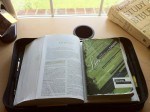At church on Sunday, a friend leaned over and asked me what Bible I was using. It happened to be the ESV Study Bible; she asked because of the many (and long) footnotes, margin references, etc., but this is only one of the Bibles that I use on a regular basis. In my experience, academic types tend to have strong opinions about their Bibles, especially on a few key points. Then again, maybe this is just me: Which translation (if any)? Bible translations come in many varieties, with several different … [Read more...] about Which Bible do you use?
